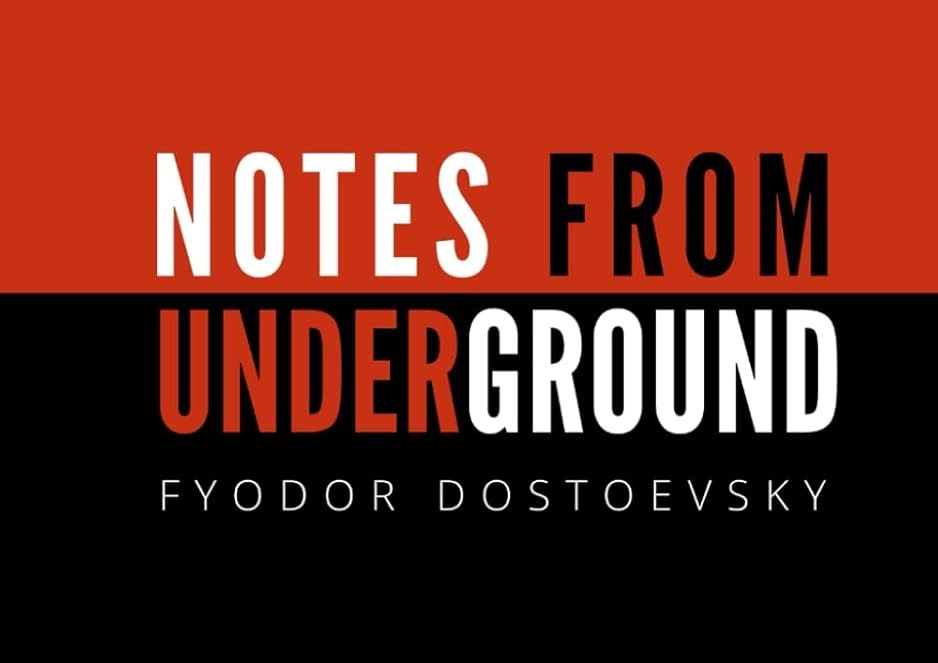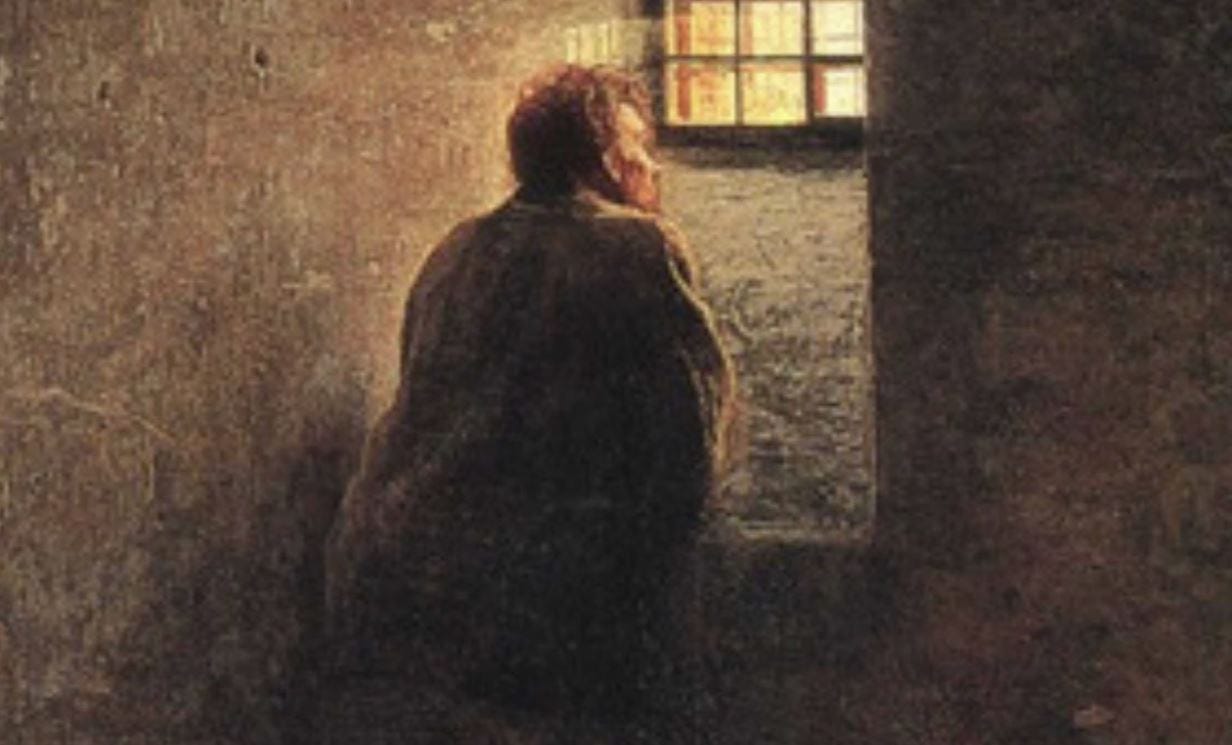Notes from Underground: Dostoevsky's take on the importance of the irrational
Dostoevsky's brief 'Notes from Underground' is quite powerful as it tackles humanity's quest for sense and desire for nonsense in a pretty unusual way.
‘Notes from Underground’ (sometimes ‘Notes from the Underground’) was published in 1864 and it sits, in Dostoevsky’s literary works, in between The House of the Dead (1862) and Crime and Punishment (1866). If you know Crime and Punishment, then let me tell you that Notes from Underground is a very, very different animal.
This novella packs a different style and, especially in the first part, assails you with a great deal to think about for weeks and months to come (actually a lot more food for thought than the excellent Crime and Punishment). Essentially, the anonymous protagonist argues against reason.
The novella comes in two parts, the first is essentially a first-person rant, with the narrator talking to us directly. We don’t know his name, but can glean that he is a retired civil servant. We know that he lives in St. Petersburg, in a basement flat, on modest means - and he is not just frustrated, he is physically and mentally festering, he is seething with anger about, well, everything and everyone. He sits there in his basement like a malevolent creature of darkness. The novella begins like this:
“I am a sick man.... I am a spiteful man. I am an unattractive man. I believe my liver is diseased. However, I know nothing at all about my disease, and do not know for certain what ails me. I don’t consult a doctor for it, and never have, though I have a respect for medicine and doctors. Besides, I am extremely superstitious, sufficiently so to respect medicine, anyway (I am well-educated enough not to be superstitious, but I am superstitious). No, I refuse to consult a doctor from spite.”
It is this first part of the novel that is masterful, in that it will leave you with lots and lots to consider. In this part, the Underground Man talks to us, he rants and raves, he argues, he questions and he analyzes from that bitter place that is his life. Part two then is penned in an abruptly different style and it feels like Dostoevsky did that to humanize his anonymous man. In part two the narrator relates moments and times and people of his earlier life and there we learn where his aggression and downright hatred (also self-hatred) come from.
As I read this novella, spending time with the rantings of this man, I couldn’t help but see all sorts of connections pop up. There is, for example, a clear reason to be found here for why MAGA people vote for Trump. There are insights into our lives today, there are flashes of Huxley’s Brave New World - there are even times when you can’t help but think that the Underground Man is talking about the rise of artificial intelligence.
Dostoevsky was a man of his times and in his literary ways he fought his battles. In this case he very much railed against determinism - about the idea that everything is set, that everything is ‘two time two makes four’. At that time, there was a considerable focus on humanity’s striving toward utopia, to a place were all is sound and clear and guided by reason. The Underground Man says,
“Consequently we have only to discover these laws of nature, and man will no longer have to answer for his actions and life will become exceedingly easy for him. All human actions will then, of course, be tabulated according to these laws, mathematically, like tables of logarithms up to 108,000, and entered in an index; or, better still, there would be published certain edifying works of the nature of encyclopedic lexicons, in which everything will be so clearly calculated and explained that there will be no more incidents or adventures in the world.”
But Dostoevsky and his Underground Man take a stand against it and argue for free will, for emotion, for foolishness, for irrationality, for free choice! If all’s well and beautiful and perfect, what remains that makes us human? The Underground Man then suggests that, in such a society that is all set with rules and laws and clarity and reason to guide all, rule all, a man just may rise and say “Hadn’t we better kick over the whole show and scatter rationalism to the winds, simply to send these logarithms to the devil, and to enable us to live once more at our own sweet foolish will!”
He goes on to argue that no doubt this man would find followers for the simple reason that “man everywhere and at all times, whoever he may be, has preferred to act as he chose and not in the least as his reason and advantage dictated.” The Underground Man asks,
“What is to be done with the millions of facts that bear witness that men, consciously, that is fully understanding their real interests, have left them in the background and have rushed headlong on another path, to meet peril and danger, compelled to this course by nobody and by nothing, but, as it were, simply disliking the beaten track, and have obstinately, willfully, struck out another difficult, absurd way, seeking it almost in the darkness. So, I suppose, this obstinacy and perversity were pleasanter to them than any advantage.... Advantage! What is advantage? And will you take it upon yourself to define with perfect accuracy in what the advantage of man consists? And what if it so happens that a man’s advantage, sometimes, not only may, but even must, consist in his desiring in certain cases what is harmful to himself and not advantageous.”
The Underground Man argues that there’s something greater than the reasonable advantages that come with the seeking and attaining of prosperity - and that is
“One’s own free unfettered choice, one’s own caprice, however wild it may be, one’s own fancy worked up at times to frenzy—is that very “most advantageous advantage” which we have overlooked, which comes under no classification and against which all systems and theories are continually being shattered to atoms. And how do these wiseacres know that man wants a normal, a virtuous choice? What has made them conceive that man must want a rationally advantageous choice? What man wants is simply independent choice, whatever that independence may cost and wherever it may lead. And choice, of course, the devil only knows what choice.”
Choice - the freedom to consciously do something irreverent, something nonsensical, something downright stupid … We’ve all been there, haven’t we? And how often have we not done that irreverent thing, that stupid thing, because of what the world around us might think.
It is absolutely true that we have created a global social contract that relies on sense, on reason. That’s how we manage to function as a global society - with rules and guidelines and social norms … but is the Underground Man onto something?
Is, because of all of those rules, something missing from our lives? Where do people still have the chance to ‘go nuts’ for the sheer joy of it? Was the anarchy of Fight Club created out of that need? Are novels, are films, are clubs and sports and art in general places where we can experience that ultimate freedom of choice? If all is set, determined, clear, guided, ruled what’s left of the human spirit? The Underground Man muses,
“Indeed, if there really is some day discovered a formula for all our desires and caprices—that is, an explanation of what they depend upon, by what laws they arise, how they develop, what they are aiming at in one case and in another and so on, that is a real mathematical formula—then, most likely, man will at once cease to feel desire, indeed, he will be certain to. For who would want to choose by rule? Besides, he will at once be transformed from a human being into an organ-stop or something of the sort; for what is a man without desires, without free will and without choice, if not a stop in an organ? What do you think? Let us reckon the chances—can such a thing happen or not?”
I’ll leave it at this. Should you with to peruse Notes from the Underground online - find it here at the Gutenberg Project. But, frankly, I think this is one for your shelf. It’ll be read more than once, it’ll be marked up - and it’ll sit somewhere between Brave New World and the works of Friedrich Nietzsche. Nietzsche, by the way, is said to have been impacted in his thinking by Notes from the Underground.
That’s it for today - I’m outta here.
Cheers,
D





